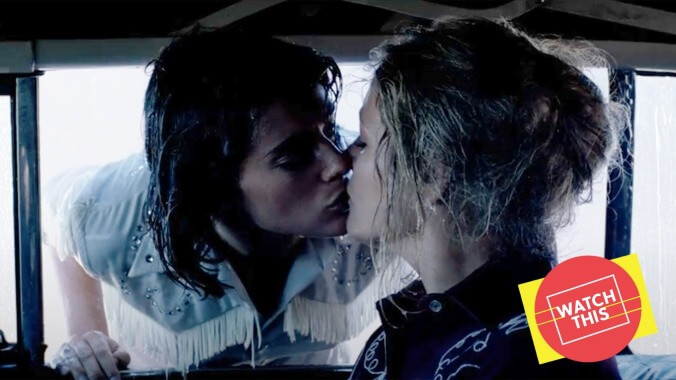The groundbreaking Desert Hearts brought lesbian romance to American screens

Watch This offers movie recommendations inspired by new releases, premieres, current events, or occasionally just our own inscrutable whims. This week: It’s the start of Pride Month, so we’re looking back at some major or influential highlights of queer cinema.
Desert Hearts (1985)
On its surface, Desert Hearts doesn’t seem like such a groundbreaking film. It’s the opposite of flashy—a quiet, intimate portrait of love blossoming between two women against a rocky Reno backdrop. But in 1985, it was revolutionary just to make a lesbian romance the center of a film—especially one that did not end in tragedy. (For just one unfortunate example of the prevailing trend: Shirley MacLaine’s character in 1961’s The Children’s Hour is so horrified by her romantic feelings for Audrey Hepburn that she hangs herself.) Things fortunately improved by the ’80s, but lesbian love scenes in mainstream films were usually still a mere detour for a character on her way to a relationship with a man—see Mariel Hemingway in 1982’s Personal Best or Jodie Foster in 1984’s The Hotel New Hampshire. In Desert Hearts, based on a novel by Jane Rule, the relationship between Vivian and Cay is the primary focus of the movie, offering a new landscape for cinema to explore.
Donna Deitch’s period piece, which she funded with help from backers like Gloria Steinem and Lily Tomlin, takes place in Reno in 1959. “The Biggest Little City In The World” (a movie setting that harkens back to the days of 1939’s The Women) was a popular spot for women to get quickie divorces by setting up residency for six weeks. Vivian Bell (Helen Shaver) is a stuffy English literature professor from Columbia University who wants to dissolve her loveless marriage. She takes up residency at the ranch of Frances Parker (Three’s Company sitcom star Audra Lindley, the biggest name in the cast), a warm, down-to-earth woman who claims that out in “God’s backyard,” Vivian will enjoy “lots of iced tea and no deep thinking.” But Vivian’s desert respite is soon rocked by Frances’ sort-of daughter, Cay (Patricia Charbonneau, in her film debut), a coltish free spirit who is upfront about her attraction to and relationships with women. To Vivian, Cay represents all the things she isn’t—confident, unrepressed, free to be herself—which makes her all the more attractive to someone who’s still searching for answers.
 Keep scrolling for more great stories.
Keep scrolling for more great stories.
